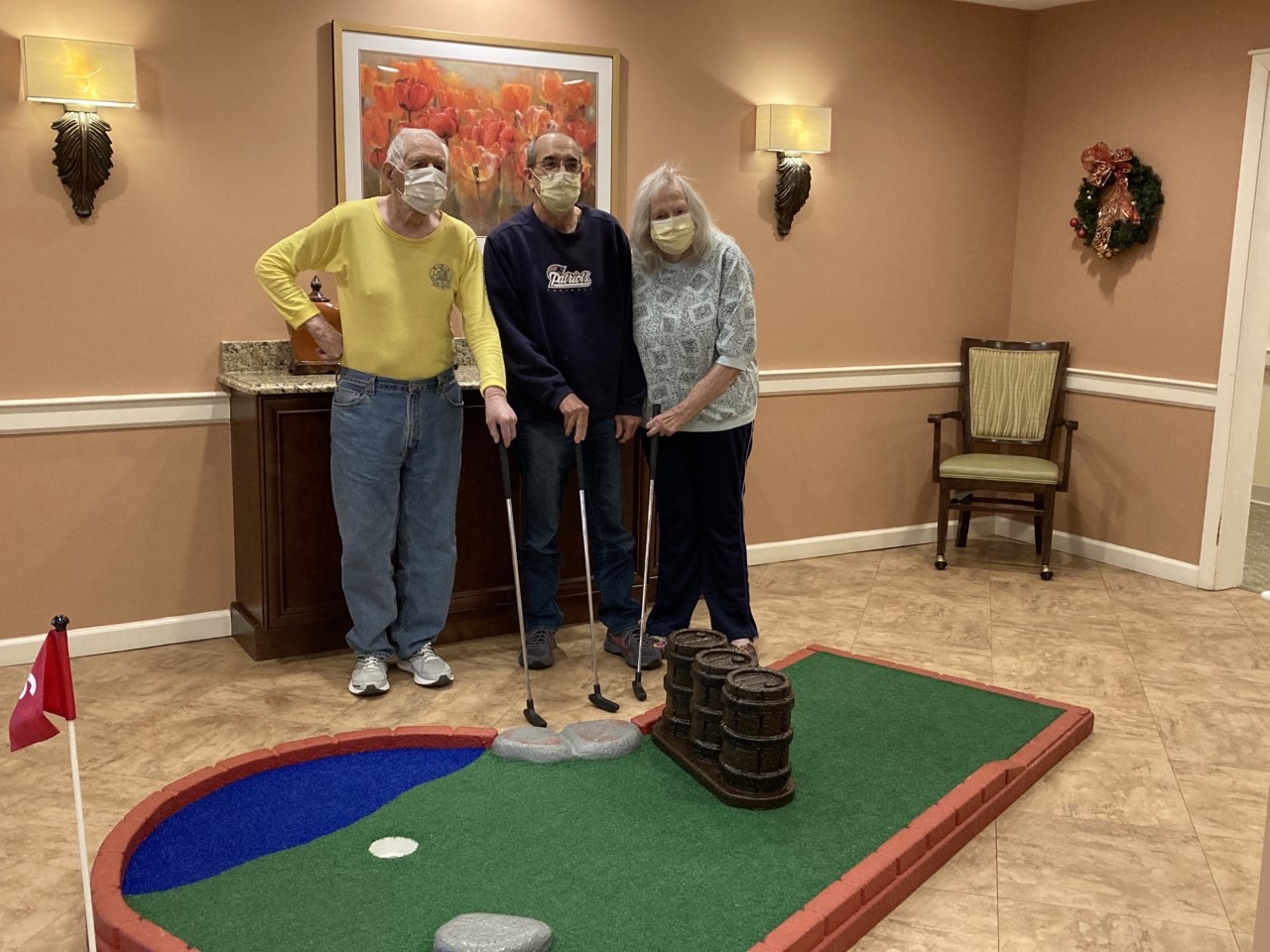Difficult dementia behaviors can range from angry outbursts to physical manifestations. Dealing with them is one of the most stressful caregiver duties.

When providing care for a loved one with dementia, there are many challenges you face as a caregiver. As your loved one’s condition worsens, so does their ability to communicate, act and think clearly, and perform many common daily tasks we take for granted.
Any anger or frustration you may feel as a dementia caregiver is normal and does not mean you are a bad person.
It is important to remember when dealing with any of these difficult behaviors, that individuals with dementia are not deliberately being difficult.
1. Sundowning – Managing Nighttime Dementia Behavior

Sundowning is a heightened sense of restlessness, confusion, and anxiety people living with Alzheimer’s or dementia often experience late in the day and as night approaches.
Because Dementia is a brain disease, it can greatly disrupt the normal sleep cycle, which increases nighttime effects.
Here are several tips for management of dementia-induced Sundowning behavior:
- Monitor your loved one’s diet to limit sugar, non-nutritious foods, and caffeine.
- Set up a sleep schedule to encourage a mental wind-down before bedtime.
- Physical activity should be encouraged throughout the day.
- Keep a commode near their bed to help eliminate confusion in finding the bathroom during the night.
About Dementia & Sundowning Behavior
Overstimulation, especially before bedtime can negatively impact sleep. A fear of the dark may surface due to confusion and anxiety about the unknown.
Too much caffeine, sugar, or other stimulants can cause an increase in sundowning behavior.
2. Anger – Management of Dementia-Aggression

Flares of aggression and anger directed toward caregivers and other family members are reported in 30% of dementia patients.
We’ve listed a few methods for management of dementia-induced aggression or anger:
- Make sure you and your loved one are not in any physical danger. Then let the behavior run its course.
- Remember, you are not the cause of the anger. Aggression is a natural part of dementia.
- Try to distract the person by focusing their attention on a topic of discussion or activity away from the anger and towards a source of joy.
- Refrain from hugging or physically comforting your loved one. This is a natural response under normal circumstances, but physical contact often only increases the severity of the outburst.
About Dementia Aggression & Anger Behavior
While common, aggression can sometimes be severe and is often rooted in their frustration of being unable to complete everyday tasks.
Pain or physical discomfort or overstimulation of the senses for Alzheimer’s or dementia patients—often from loud TVs, bright lights, or temperatures too hot or too cold—can cause aggression.
An upsurge in anger can occur when there is a lack of trust (real or imagined) in a caregiver or family member.
If the individual is confused or unfamiliar with a person or place, it can lead to aggressive speech or behavior.
3. Wandering – How to Manage Wandering & Roaming

A stressful or over-stimulating environment can cause an individual with dementia to leave home or place of care without anyone noticing.
Stress can trigger disorientation and fear which may prompt a wandering episode.
Below are our strategies for management of dementia-induced wandering behavior:
- Reduce noise in the home, including loud TVs, computers, or exhaust fans can prevent increased levels of stress and anxiety.
- If they are able, encourage your loved one to engage in physical activity – exercise, dancing, or movement games – to reduce restlessness and promote restful sleep.
- If your loved one begins pacing or appears distressed, offer reassurance he or she is secure and in a safe place.
- Remove items commonly taken when leaving the home, such as keys, wallets, jewelry, and purses.
- Talk to the doctor about pain treatment options. A dementia patient may be wandering in an attempt to escape pain and discomfort.
About Dementia & Wandering Behavior
As dementia progresses, it can be difficult for your loved one to remember major environmental and life changes.
They may mistakenly engage in old routines, such as leaving the house to go to work at a job they have long since retired from or to visit a store no longer in business.
In addition, wandering can be caused by pain and discomfort, a lack of physical activity or simply by searching for locations related to normal, daily activities, such as the bathroom or kitchen.
4. Repetitive Actions – Managing Repetitive Behavior

By focusing on the emotional stimuli that drive the behaviors, you can reduce the frustration you feel as a caregiver.
Remember in these episodes of repetition, your loved one needs assurance and comfort most of all.
Other than modeling your own patience as a caring loved one, there is nothing a typical family member or caregiver can do to prevent a dementia patient’s repetitive behavior.
About Dementia-induced Repetitive Actions
While repeating an activity, question, or sentence, again and again, can be an exhausting and frustrating behavior for caregivers to work around, it is a common occurrence for those with dementia.
It is often rooted in confusion, stress, and anxiety in response to difficulty in remembering or fear about their declining ability to perform certain tasks, speak, or remember.
5. Hallucinations – Managing Dementia Hallucination Behavior

\In dementia, the brain’s gradual decline is the root of hallucinations & the associated behavior.
Talk to the physician immediately if your loved one begins to show signs of experiencing hallucinations.
Here are several tips for management of dementia-induced hallucinations:
- Create a tranquil surrounding with low light, quiet, and a comfortable room temperature.
- Remove any potential obstacles or tripping hazards.
- Offer reassurance that you are near, the room is safe, and he or she is secure and loved.
- Direct your loved one’s energy and attention to a favorite song, memory, or game to shift the mind away from feelings of paranoia and toward a calm, relaxed state.
About Dementia Hallucinations
Hallucinations often occur in the later stages of dementia-related illnesses.
They may begin as auditory hallucinations but can manifest in any of the senses where your loved one may taste, smell, feel, see, and hear things that aren’t real.
Hallucinations can be caused by dehydration, infection, or an adverse reaction to medication.
6. Hoarding – Managing Hiding & Rummaging Behavior

The dementia caregiver is confronted by many challenges and obstacles, but an understanding of the root of the difficult behaviors helps to lessen the caregiver’s anxiety.
By keeping patience and love at the top of the emotional toolbox, caregivers can provide the care and support needed at this most difficult time.
We’ve listed a few methods for management of dementia-induced aggression or anger:
- Remember that this behavior provides a sense of comfort and security at some level.
- Assess the situation from the standpoint of what may be potentially harmful. Address and remove only those items.
- Negotiate the removal of other harmful items to which your loved one may have an emotional attachment.
- Offering a trade – new socks for old ones; a fresh piece of fruit for the apple core – can help move the process along.
- Let your loved one know items can be donated to a church, charitable organization, or a family in need. This may make him or her more willing to part with the items.
About Dementia Hoarding
Collecting, hiding, and hoarding items is normally a harmless behavior, but more advanced cases can pose serious health risks.
Often caused by confusion, this behavior communicates the need for security, novelty, and control. There may also be an inability to distinguish trash from other items.
Sometimes collecting, hiding, and hoarding are an attempt to cure boredom and a lack of stimulating activity.
The behavior can also be involuntary, as the ability to recall information declines and the memory of where certain items were placed is lost.
Examine dementia behavior objectively.

Their sense of reality is different from ours but very real to them. We can’t change the person with dementia, but as caregivers, we can employ strategies to deal with problem behaviors.
It is important to examine the behavior objectively.
- Can the actions of your loved one result in any harm to them or to others?
- Is the behavior embarrassing, disruptive, or uncomfortable, but may not be harmful?
If mom is insisting on wearing multiple blouses on top of one another, let it go. Protect her from harm and then allow some sense of freedom by agreeing to let her make her own choices when possible.
Though dementia-related illnesses can differ, their progression usually triggers difficult behaviors that are similar across the spectrum of the disease. Here is a brief view of several common difficult behaviors and some suggestions on how to manage them.
Further Reading
In addition to these six dementia behavior management methods, we also have written extensively on senior health and caregiver stress.
Senior Health Guides
- 7 Tips to Improve Senior Mental Health
- Senior Health: 10 Top Concerns
- Natural Ways to Boost Seniors’ Immune Systems
- Senior Exercise Promotes Health & Independence
- Aging with Dignity (video)
- High Blood Pressure May Increase the Risk of Dementia
Caregiver Support Guides
Contact Us
In addition to housing, healthcare, and programs for seniors, SALMON Health and Retirement communities offer resources for caregivers and family members.
To learn more about the options available to you and your loved ones, contact us today for more information.




